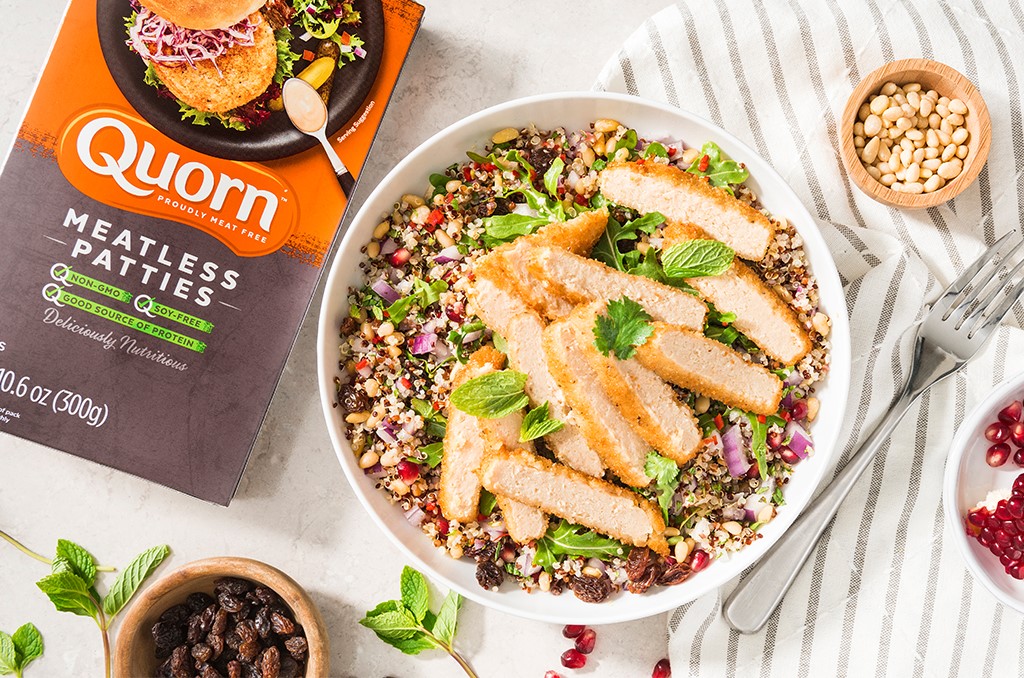Meatless brand Quorn has been working to demystify fungi-derived mycoprotein—sometimes known as mushroom meat—to show consumers all of its benefits, from a sustainable food source to a health-promoting protein. This work comes as a growing number of adults are eating less meat, with the latest figures showing that there are more than seven million American adults who now follow a meat-free diet.
“Quorn’s research journey started more than 35 years ago, when mycoprotein was a novel food and needed to undergo rigorous testing to demonstrate it was safe to eat. Studies showed some positive health benefits, so we’ve been investing in exploring the link between mycoprotein and health ever since,” Hannah Theobald, PhD, Head of Nutrition at Quorn Foods, tells VegNews.
In recent years, the brand has been diving deeper into research by commissioning scientific studies about mushroom meat’s health benefits, which range from heart health to muscle protein synthesis. A recent study published in the Journal of Nutrition found that mycoprotein is just as effective at supporting muscle building during resistance training as animal protein. The study, from researchers at the University of Exeter in the United Kingdom, claims that it is the first to explore if a vegan diet rich in mycoprotein can support muscle growth during resistance training to the same extent as an omnivorous diet.
 Quorn
Quorn
Research suggests that, as well as its excellent nutrition profile, the structural complexity of mycoprotein’s cell wall, which is retained through the production process, may explain why it is so good for metabolic health.
As well, research published by the University of Exeter in 2020 found that mycoprotein builds muscle to a greater extent than milk protein, and a 2021 study concluding that a mycoprotein-rich vegan diet supports the maintenance of muscle tissue in older adults.
Another study found that meat alternatives such as mycoprotein can lower bad cholesterol, while other studies have found that mycoprotein is linked to gut health benefits and a reduction in genotoxins known to cause colon cancer.
“With more advice encouraging everyone to consume less meat to improve health, both for their bodies and the planet, the benefits of alternatives like Quorn’s mycoprotein become that much more important,” Theobald says.
Theobald also points out that mycoprotein is a complete protein, meaning it contains all of the nine essential amino acids needed by our bodies, making it a high-quality protein. It’s also high in fiber (“most Americans aren’t eating anywhere near enough fiber,” Theobald says), low in saturated fat, free from artificial trans-fat and cholesterol, and it also provides riboflavin, choline, folate, manganese, phosphorus, and zinc.
“Because of these factors, it opens the doors to various health and nutrition benefits that we’re continuing to discover and explore,” Theobald says.
Is mycoprotein healthy?
But what does Quorn hope to achieve with its scientific findings? “The word ‘fungi’ can be somewhat daunting to consumers, so these studies help to demystify that term further, and open their eyes to the possibilities of diets inclusive of nutrient-rich alternative proteins,” Tim Ingmire, Chief Research & Development Officer at Quorn Foods, tells VegNews.
And, notably, Quorn wants to ensure mycoprotein is recognized as a healthy and sustainable protein source by governments and stakeholders around the world, including in the United States.
“The US Government is currently reviewing the Dietary Guidelines for Americans, so I’d really like to see them recognize mycoprotein or fungi protein in their update and the next update to MyPlate,” Theobald says. “We’ve got plenty of evidence to support this ask.”
 Quorn
Quorn
This type of research could help the wider mycoprotein sector build a stronger position within the meat alternatives market. In fact, the global mycoprotein market is anticipated to reach nearly $1 billion by 2032, according to market research firm Future Market Insights.
“If we are to facilitate a global shift of diets to ones which are rich in mycoprotein, then it is critical that the benefits (and uses) of mycoprotein are as familiar as those of everyday ingredients such as meat or wheat,” Ingmire says.
“At a time when concerns around ultra-processed foods are growing, our hope is that establishing a solid base of high-quality nutritional and environmental research on mycoprotein will help overcome any concerns around its use.”
Building on the science of mushroom meat
In addition to the studies already conducted, Quorn is continuing to build on its solid base of research. To do so, the brand partners with universities and research institutes to undertake research and supports early-career researchers. Importantly, Theobald says, Quorn gives all its academic partners publication freedom, encouraging them to publish their findings whether they are favorable or not to Quorn.
 Quorn
Quorn
While the brand’s key areas of research are currently focused on gut health, cardiometabolic health, muscle protein synthesis, and understanding the impact of the general structure of Quorn mycoprotein on health, there’s still more to come. “We’re also just starting an exciting new study to understand the effect of mycoprotein on weight loss in a low-calorie diet and whether it can help prevent subsequent weight regain,” Theobald says.
“Making the scientific evidence on Quorn mycoprotein and health publicly available is essential if we want to see a shift to more healthy and sustainable diets around the world. We are committed to continuing our research to understand the broader health benefits of mycoprotein and the mechanisms behind these benefits.”
For the latest vegan news, read:
JUMP TO ... Latest News | Recipes | Guides | Health | Subscribe









